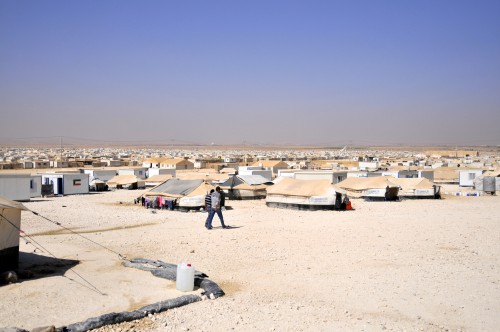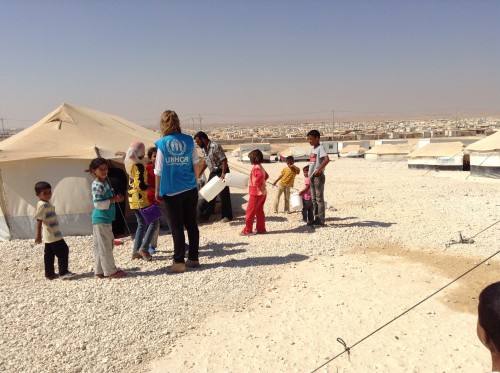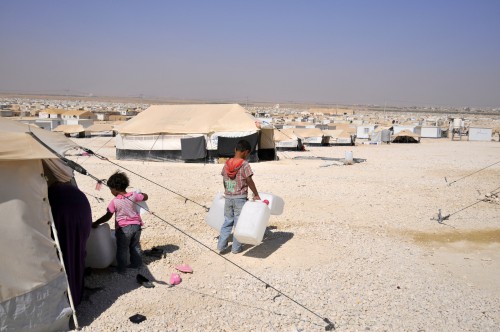21st August 2013
World Humanitarian Day: So What?
Monday 19 August was World Humanitarian Day. Such days – which mark important international themes – occur regularly. But few can be as relevant and important this year given the severe refugee crisis caused by the tragic violence in Syria.
There are now almost 2 million Syrians – 10% of the population – in neighbouring countries, mainly Jordan, Lebanon, Turkey and Iraq. Over 20,000 have fled to Iraq in the last few days. Earlier this year 2-3,000 Syrians were crossing into Jordan every day. And within Syria itself 6 million Syrians have been forced to leave their homes. Most of these people need help to feed their families, whereas Syria used to be the regions bread basket.
I have seen the impact of the refugee flows at first hand. On my first visit to Za’atari last July there were just a few tents in a hot and dusty compound. When I visited the camp yesterday I saw a place that feels like a major city, housing over 120,000 people. It has a school, clinics and a thriving main street where fruit, vegetables, clothing and even argilehs are being freely traded. Za’atari is now one of the biggest “towns” in Jordan.

From the very start, these Syrians have been crying out for help: shelter, food, medicine. And the international community has been obliged to help, not only the refugees, but also the Jordanian Government and host communities who have so generously opened their doors to those in need. Helping the poor and needy is surely one of the true tests of a civilised world.
The refugees are also fighting for their dignity. Many households are led by women, since the father or husband has stayed back to fight or been killed. Protecting women and children has therefore become a major motivating factor both for the mothers and for the UN. Offering education and places for children, such as the “Child-Friendly- Spaces” organised by Save the Children is also a crucial part of the camp’s services.

But we must not forget the wider humanitarian need. Over two-thirds of the Syrian refugees in Jordan are living in the community, not in the camp. They too need somewhere to live and a way to provide food and water for their families. Many towns in the north of Jordan have struggled to cope. It is our duty to help those host communities too.
Of course we also need to tackle the cause of the crisis. It is tragic that what started as a popular protest in Syria two years ago has now become a proxy war. A political solution that offers a new democratic Syria remains a priority.
The UK has been a major player in the international response alongside other donors, including the European Union. The UK’s humanitarian aid amounts to £348 million, the largest ever UK response to a humanitarian crisis.

Looking more widely, Jordan has historically been a haven for refugees, from Palestine, Lebanon and Iraq. That is why the UK is also committed to helping the UN agency that supports Palestinian refugees, UNRWA, to the tune of $166 million over the current 4 year period.
None of the humanitarian work could be done, here and in other countries, without the international and local teams of workers who help to organise camps and the help for refugees outside the camps. I have watched the United Nations , who go by an alphabet soup of acronyms like UNHCR, UNICEF, WFP and OCHA rise to the massive challenge of housing, feeding and caring for those in need. And I have seen their Jordanian counterparts, especially the Jordanian Armed Forces become a vital part of this effort.
On World Humanitarian Day, we should take our hats off to these people.
Have you ever considered writing an ebook or guedt authoring
on other blogs? I have a blog based upon on the same information you discuss and would
really like too have you share some stories/information. I kniw my visitors would value
your work. If you are even remotely interested, feel free to send me an email.
Dear Peter,
guess you must have a lot of patience with me and my not so short comments. But I just do think (sorry!), that if I ´m writing some lines to a very sad and serious topic like WORLD HUMANITARIAN DAY you must do it proper and exactly. So pls. allow me to begin. You ´re right by telling us about the tragic (and deadly !) violence in Syria. You ´re also total right, that neighbouring states like The Lebanon, Jordan or Turkey are suffering in a way of which they never knew before. It ´s once again a human made disaster and I can see at the moment no ending. So what (to do?). you once wrote in a report, that you left the area of Camp Za ´ atari out for good reasons cause you want to draw attention to the ENTIRE NORTH EAST region of Jordan.A clever and wise intention.That ´s why it was a shock to me by reading that this Camp has become one of the biggest cities in Jordan. Esp. chapter 3 & 4 are pure horror to read. By the way and within this context: As always when I do read an article of you I do learn sthg. new. In this case: So far I didn ´t know that Jordan has “historicaly been a haven for refugees, Palestinians, Lebanese, Iraqi. Last but not least : To me it ´s unimportant which kind of organization is willing to help Syrian (Palestinian) refugees. Doesn´t matter , whether it ´s the UNHCR, the UNICEF, Ocha or WFP. As long as they really wanna help. So to me and esp. at the moment , every day should be a WORLD HUMANITARIAN DAY. To conclude : I ´ve only one big, big sorrow : What happens if Iran and Israel are starting a new war ? With their enormous arsenal of A, B, C – weapons is the whole Middle East Area in a permament fear. Will the INTERNATIONAL COMMUNITY simply forget the current Jordan/Syrian refugee crisis? And the human tragedy in Jordan or The Lebanon ? Not to mention the now official civil war in Egypt. Will we all turning over to this “new” Iran/Israeli war if no one is able to stop it immediately ? Will it end in an atomic firestorm? Well, surely NOT at this time. But in 2 or 3 years ? Is the Syrian /Jordan refugee conflict on the best way to become “Yesterdays Papers”. (Rolling Stones). STILL we do have the chance to avoid it. But time could be short, time could be running out – if we let the things happen. Albert Schweitzer once said : ” Solange die Menschen miteinader reden, kämpfen sie nicht und es ist nichts verloren.” In this sense: Your photos are just terrible. B U T they have to be shown. So that no one can say : Oh, sorry- didn ´t know of how worse things have been. Best wishes and more peacefull times , take care ond grösstmöglicher Erfolg bei Deiner Friedensarbeit ! Respect…Ingo-Steven, Stutengarten/ Baden-Wuerttemberg